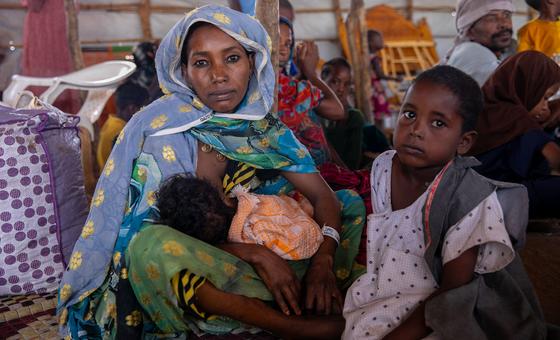In the first week of October alone, close to 25,000 people fled to eastern Chad, marking the highest weekly influx this year. This follows months of intensifying violence in Darfur, and Chad now hosts over 600,000 Sudanese refugees, which is more than any other country in the region.
Since the conflict began 18 months ago, almost three million refugees have fled Sudan, seeking safety in countries such as the Central African Republic, Egypt, Ethiopia, Libya, South Sudan, and Uganda.
Inside Sudan itself, the International Organization for Migration (IOM) reports that nearly 40,000 people have been newly displaced in the first half of October alone. Total internal displacement has now reached nearly 8.2 million.
Crucial time for aid
With the rains subsiding, aid organizations are rushing to deliver vital supplies to the hardest-hit areas. OCHA is calling on all parties to stop the fighting, protect civilians, and facilitate humanitarian access. In Chad, the Birak Health Centre is overwhelmed by the influx of refugees, with funding shortages slowing down the provision of essential services.
Meanwhile, the cholera outbreak continues to worsen, with over 24,000 reported cases and 700 deaths since mid-July. The UN Refugee Agency, UNHCR, is working to relocate refugees and provide large-scale immunisation, but funding limitations persist.
Gaza: Aid supplies are there, but not access to those in need
There are currently 100,000 metric tonnes of food waiting to be imported into Gaza by the World Food Programme and UN Palestine refugee agency (UNRWA), amounting to enough food for everybody for the next three to four months, said UNRWA representative Scott Andersen briefing journalists at UN Headquarters in New York on Wednesday.
However, while the supplies exist, the environment to deliver does not, according to Mr. Anderson.
“It’s just difficult to get aid to people at all,” he said, pointing out that prior to Israel’s Rafah offensive in May, there were 350 trucks getting in a day – a figure that’s shrunk to 30 trucks, on a good day.
UNRWA is coordinating closely with the Israel Defense Forces (IDF) to try to create a more enabling environment for aid workers to get supplies in, but “we’re not quite there,” Mr. Anderson said.
In North Gaza, there are around 470,000 people still there amid an ongoing operation by the IDF. Of those, 65,000 have been displaced again.
Meanwhile, in the declared humanitarian zone in the south, 1.4 million people are contained in dwindling space.
Mantra continues: Nowhere is safe
According to Mr. Anderson, even in the zone, “nowhere in Gaza is safe”, noting the air and missile strikes that have taken place there and killed many civilians.
Mr. Anderson added that the hospitals are “somewhat in name only” due to the lack of equipment and supplies needed for proper secondary and tertiary care following the strikes.
625,000 children in Gaza are also currently out of primary school education which, combined with the effects of COVID-19, makes this the fourth year out of five that they have missed out on formal education.
“I’m very concerned about the lost generation,” he said, stressing the impact it will also have across generations as these children become parents themselves.
South Sudan: UN reports sharp rise in violence against civilians
The UN Mission in South Sudan (UNMISS) has urged the Government to protect the population by preventing repeated cycles of violence.
The latest UNMISS quarterly brief, covering the period from April to June, reveals a steep increase in the number of violent incidents affecting civilians, including abductions and attacks against women.
The Mission recorded 317 incidents affecting at least 1,062 civilians, including 160 women and 188 children. Of this number, 442 were killed, 297 injured, 197 abducted, and 126 were subjected to sexual violence.
This represents a 43 per cent increase in incidents, and a 22 percent rise in the number of victims, over the same period in 2023.
The figures also indicate a 32 per cent uptick in violent incidents, and a 16 per cent increase in the number of victims, in comparison to the first quarter of this year (January to March).
Abductions and sexual violence
UNMISS was particularly concerned about the upsurge in documented abductions and sexual violence when compared to the previous quarter.
Abductions increased by an alarming 181 per cent, from 70 to 197, with most documented in parts of Juba, Morobo, and Yei counties in Central Equatoria state.
Similarly, the number of victims of sexual violence jumped 168 per cent, from 27 to 126.
Tambura county in Western Equatoria state recorded the highest incidents of conflict-related sexual violence – an issue that continues to disproportionately affect women and girls, who account for 99 per cent of victims.
The Mission said inter/intra-communal violence by community-based militias and/or civil defense groups linked to border disputes, cross-border violence, cyclical and retaliatory attacks, as well as ethnic polarization, remained the primary source of subnational violence.
This unrest accounted for 83 percent of victims, 883 people, however, nationwide trends of violence involving conventional parties to the conflict remained low during the reporting period.
UN human rights office urges halt to execution of two men in US
The UN human rights office, OHCHR, has urged legislators in the United States to join a growing number of nations who’ve abolished the death penalty.
The appeal comes ahead of Thursday’s scheduled execution of two men in the US: Robert Robertson and Derrick Dearman.
Mr. Robertson’s death sentence was delivered “despite substantial evidence of wrongful conviction”, OHCHR said, noting that six people in five different US states were executed over a 12-day period last month.
“This rise in the rate of executions is deeply worrying,” said OHCHR spokesperson Seif Magango, adding that evidence suggested the punishment “has little to no effect in deterring crime”.
Approximately 170 countries have abolished the death penalty to date, according to OHCHR.

